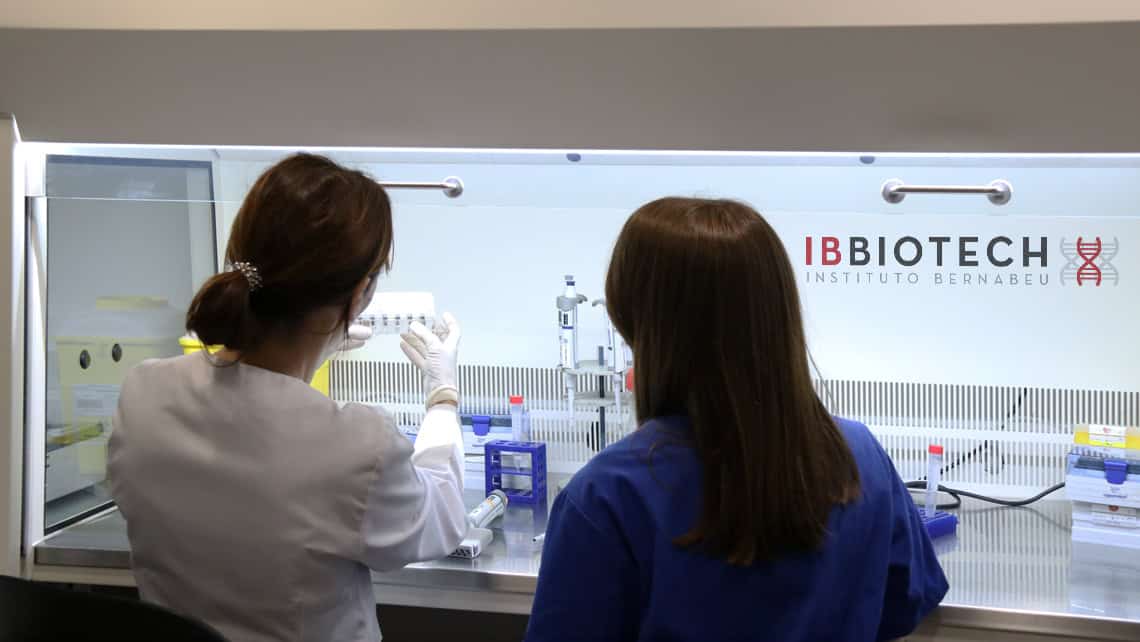Instituto Bernabeu’s new neonatal genetic study improves the “heel prick test” with the detection of more than 1,500 hereditary diseases
April, 18th 2024

- This study, called IBGen Baby, analyses 1,320 genes and detects diseases not included in the public health system’s “heel prick”.
- Early detection of these diseases makes it possible to initiate appropriate treatment in time and provide the necessary support to parents, thus improving the baby’s quality of life and their families’.
- WHO estimates that 240,000 newborns die each year worldwide in the first 28 days of life from congenital disorders.
The team of researchers at the molecular genetics laboratory of Instituto Bernabeu (IB Biotech) has developed IBGen Baby, an extended neonatal genetic study that analyses 1,320 genes and allows the identification of more than 1,500 hereditary diseases and disorders in newborn babies. This study improves the so-called “heel prick test”, the genetic screening performed in Spanish public hospitals, and detects diseases not included in the usual tests performed on a newborn.

Recently, the Spanish Ministry of Health has announced that the number of congenital metabolic diseases that will be analysed through neonatal screening in all Autonomous Communities will increase from 7 to 18. But IBGen Baby goes further, including not only metabolic disorders, but also neurological diseases. The conditions detected include disorders of amino acid metabolism, fatty acid oxidation, organic acid, carbohydrate, creatine metabolism, lysosomal storage disease and blood lipid disorders, which can lead to diseases such as diabetes, haemophilia, deafness, anaemia, eye diseases, hypothyroidism, hyperthyroidism or hyperlipidaemia. In addition, neurological pathologies such as spinal muscular atrophy and genetic conditions such as congenital hearing loss, which affects 1 in 1,000 births, among others, are identified.
One of the most significant advantages of this study is its ability to detect rare diseases that can manifest themselves from the earliest stages of a baby’s life. “Early detection of these conditions allows us to initiate appropriate treatment as early as possible and provide the necessary support to parents, thus improving the quality of life of the baby and the family,” explains Dr Belén Lledó, scientific director of Instituto Bernabeu Biotech. “Through this neonatal genetic study, we give parents the opportunity to know the genetic health of their child from the first days of life. This allows them to prepare and plan their care properly, minimising the negative impact on their child’s health,” she adds.
In addition to giving parents peace of mind, the early diagnosis provided by Instituto Bernabeu allows medical professionals to make informed decisions about the patient’s treatment. This early intervention can significantly improve the baby’s prognosis and help avoid possible future complications.
One in four infant deaths is due to genetic disorders
The World Health Organisation (WHO) estimates that 240,000 newborns die each year worldwide in the first 28 days of life due to congenital disorders. In addition, another 170,000 children between 1 month and 5 years of age die from these diseases.
In the same line, it is estimated that 25% of infant deaths are due to genetic disorders and about 30% of affected children do not survive beyond the age of five years. Genetic diseases are the leading cause of mortality in neonatal intensive care units and up to 70% of admissions to paediatric intensive care units may be wholly or partly associated with a genetic disease.
About IB Biotech
IB Biotech is Instituto Bernabeu’s molecular genetics laboratory. Since its creation in 2009, its team of researchers, led by Dr Belén Lledó, has developed advanced PGD (Preimplantation Genetic Diagnosis) techniques to detect genetic abnormalities in embryos before their transfer, during in vitro fertilisation (IVF) treatments. This makes it possible to select healthy embryos and increase success rates in assisted reproduction treatments. In addition, the laboratory has carried out leading studies in the field of pharmacogenetics, exploring how the genetic load of each individual influences the response to different treatments.
The Biotech team publishes its research in scientific journals worldwide, such as Human Reproduction, Pharmacogenet Genomics or Journal of Assisted Reproduction and Genetics, among others. It is currently developing projects applied to the fields of paediatrics, oncology and neurology, as well as gynaecology and assisted reproduction.
About Instituto Bernabeu
For more than three decades, Instituto Bernabeu has been at the forefront of reproductive medicine research. The group of specialised clinics is led by doctors Rafael and Andrea Bernabeu. Each year it attracts patients from all over the world, specifically from 137 countries. It has 9 clinics in Madrid, Alicante, Palma de Mallorca, Albacete, Cartagena, Elche, Benidorm and Venice.
This renowned Spanish institution has an extensive track record and its milestones include the birth of a child using spermatids for the first time in Spain and the sixth in the world, and the recent creation of the first artificial intelligence (AI) unit dedicated to reproductive medicine. Every day 3 babies are born in the world thanks to the professionals at Instituto Bernabeu, which has already surpassed 150,000 clinical records since its foundation.
The last congress of the Spanish Fertility Society (SEF) has recognised her research work by awarding the first and second prizes for clinical communications and the second prize for the best basic communication based on AI. In this case, the research has created an AI model with which it is possible to predict the probability of implanting chromosomally normal embryos.
Media coverage
